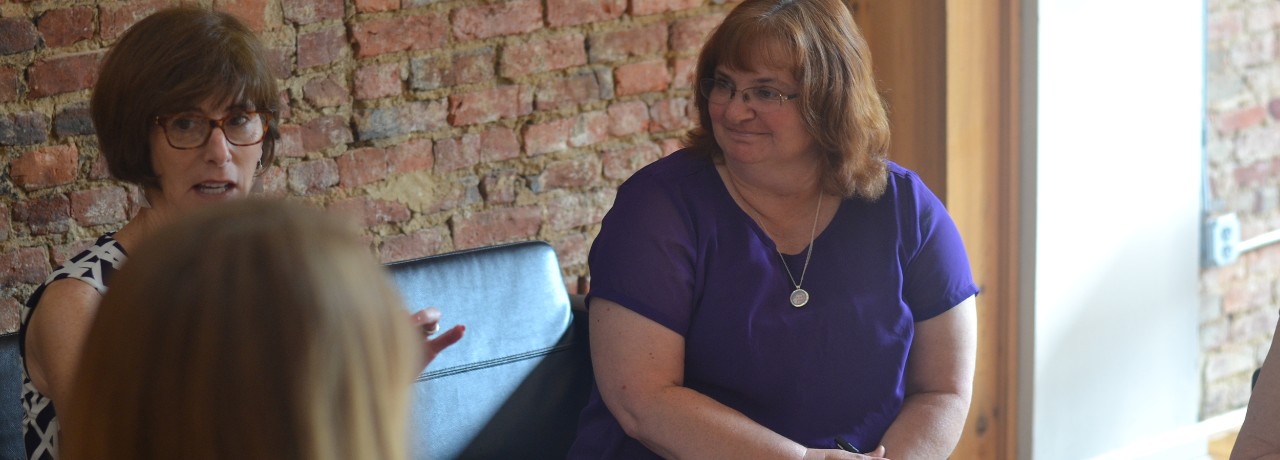
Three UC colleges collaborate on Common Ground project
With a grant from the Scripps Howard Foundation, UC's Departments of Journalism, Political Science and Communication explore political polarization and the media
Polarization is a powerful force in contemporary American politics. In a recent survey, conducted by “The Atlantic” magazine and the Public Religion Research Institute, a staggering 91 percent of respondents said that the country is divided over politics. Conservatives move further to the right and their liberal counterparts move further to the left; the slim patch of rocky land where the two sides share common ground shrinks.
But what are the origins of this polarization? And what role has media played in widening and deepening the current political divide? Are “fake news” and social media echo chambers dragging us further away from one another?
And more importantly, can we somehow move back together?
Thanks to a grant from the Scripps Howard Foundation, the University of Cincinnati’s Departments of Journalism, Political Science and Communication collaborated the Common Ground Project, an ambitious research endeavor designed to explore patterns of media engagement in the Greater Cincinnati region and analyze their effects on political perceptions.
Nancy Jennings, one of the leaders of Common Ground and a professor in UC’s Departments of Communication and Journalism, described the project as essential to re-engaging people in conversations vital to our nation’s well-being and future.
“It’s particularly challenging, I think, right now, that we don’t have space to be able to talk to one another,” Jennings said. “There’s a lot of things going on in our country, and we need to be able to openly talk about a lot of different issues. “
Between August 2017 and November 2018, Jennings teamed up with Brian Calfano, a professor in both UC’s Departments of Political Science and Journalism. Together, the two led the 15-month interdisciplinary project, interviewing a diverse sample of Cincinnati-area residents and college students on media and social media usage and habits.
“Not only is UC a major research university, it’s in the heart of the dichotomy that the Common Ground Project is meant to address,” Calfano said. “We are geographically situated in a ‘blue’ city surrounded by ‘red’ suburbs and rural areas. This is a great reminder of the need to find ways to bring people together around their common ideas, experiences and goals.”
Through Common Ground, 80 UC students were able to analyze interview results and produce news packages through two classes offered in journalism and political science. Also, as part of Common Ground, 75 students took a new interdisciplinary course called, “Post Truth & Fake News: The Challenge for Communications, Politics & Journalism.” Project results were presented at a number of conferences open to UC students, area journalists and community residents.
Philippe Chauveau, MA ’19, served as a research assistant on the Common Ground Project and said that the grant from Scripps Howard led to insights that could mend rifts and reopen constructive dialogues between individuals with opposing views.
“Of course, politics is always a huge subject, but even more so now because of how divided the public is,” Chauveau said. “The research from this project gives us more information on media polarization and its effects, political polarization, interpersonal contexts and how to have conversations, really. Without the Scripps grant, we wouldn’t have been able to start looking at how we can find common ground among different political ideologies.”
Jeff Blevins, head of UC’s burgeoning journalism department, feels that the Common Ground Project is just the beginning — “a trial balloon, a seed, a proof of concept” — for a larger initiative. Common Ground studied Cincinnati’s defining characteristics — a blue urban center surrounded by red suburban communities in a bellweather state — to understand the media consumption habits fueling our nation’s political divide.
Innovative and interdisciplinary, the Common Ground Project simultaneously broke ground on the future of UC journalism while also addressing the very real challenges facing our nation today. Blevins envisions a center for public affairs and reporting, a hub for political science expertise blended with reporting skills that boosts and contextualizes local reporting in Cincinnati.
“We’re moving beyond to how does Common Ground become permanent here,” Blevins said. “And we really feel like the formation of some type of center that’s focused on urban reporting, local reporting, but about public affairs here in Cincinnati, would certainly be a good local benefit. But I think it will also have national merit, as well.”
Related Stories
From Punchline to Pride: An Ohio class on the history of Queer
January 16, 2025
In an interview with The Buckeye Flame, a publication that amplifies the voices of LGBTQ+ Ohioans to support community and civic empowerment, UC adjunct professor Nicholas Belperio describes the impact of a class he teaches titled “Queer TV.”
WDET: Potential U.S. TikTok ban weighs national security against...
January 16, 2025
UC cybersecurity expert Dr. Richard Harknett discusses a TikTok ban with Detroit public radio. The U.S. Supreme Court is weighing whether a law passed by Congress and signed by President Joe Biden is constitutional.
Mosquitoes can be extra-bitey in droughts
January 15, 2025
UC biologists found that mosquitoes survive prolonged droughts by drinking blood, which explains how their populations rebound so quickly when it finally rains.
